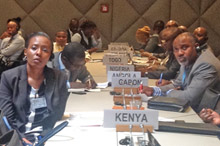Eminent Persons Group brief ACP Ambassadors to the WTO on initial findings of 18-month review
 Geneva, 9 September 2014/ ACP: The Drafting Committee of the Eminent Persons Group (EPG) of the African, Caribbean and Pacific (ACP) Group of States met the ACP Ambassadors to the World Trade Organization (WTO) to solicit their views on the Group’s future perspectives up to and beyond 2020 when the Partnership Agreement with the European Union known as Cotonou Agreement comes to an end.
Geneva, 9 September 2014/ ACP: The Drafting Committee of the Eminent Persons Group (EPG) of the African, Caribbean and Pacific (ACP) Group of States met the ACP Ambassadors to the World Trade Organization (WTO) to solicit their views on the Group’s future perspectives up to and beyond 2020 when the Partnership Agreement with the European Union known as Cotonou Agreement comes to an end.
The meeting highlighted the work undertaken by the EPG to-date and sought ACP Ambassador’s feedback on how the ACP Group can in future function efficiently and effectively at the various multilateral negotiating arena.
The EPG team, led by the chair of the Drafting Committee and former Executive Director of the International Trade Centre, Mrs. Patricia Francis along with former Executive Director of the International Monetary Fund, Mr. Peter Gakunu, shared with the Ambassadors elements of their key findings into the past performance, present challenges and future aspirations of the ACP Group. These were based on inputs gleaned from six regional consultations with stakeholders, which concluded last week with the Southern Africa session in Luanda, Angola, where Chief Olusegun Obasanjo, EPG Chairman and former President of Nigeria also participated.
At the Geneva meeting, Ambassador Marwa Kisiri, head of ACP Geneva office, delivered the opening statement on behalf of Kenya’s Ambassador John Kakonge, the current Coordinator of the ACP Geneva Group of Ambassadors in Geneva.
In his statement, Ambassador Kakonge highlighted the united approach by ACP Members at the WTO based on the need to “address capacity constraints faced by ACP countries with limited representation to the WTO”. He said that “due to their weak and vulnerable economies, a united approach has facilitated the development of unified negotiating positions to defend the interest of ACP States”.
He welcomed the coalition between the ACP, Least Developed Countries and African Groups which was key to build a consensus among developing countries that led to the adoption of the Bali package during the ninth WTO Ministerial Conference.
“The ACP network in Geneva is a critical group to involve in this process. Their contribution in the WTO is increasingly recognized through leadership roles in major consultative bodies. The ACP Group is also credited with aiding the successful completion of the 9th WTO Ministerial Conference in 2013, working effectively to bridge differences between Members’ positions, and crafting an innovative, more development-oriented approach to Trade Facilitation,” said ACP Secretary General H.E Alhaji Muhammad Mumuni.
In addition to WTO affairs, the ACP missions also deal with the full range of UN agencies and international organisations based in Geneva.
“The Group’s successes in the WTO, thanks to a combination of astute leadership, systematized coordination, support of a Geneva-Based ACP Office and the technical assistance mobilized from international partners, will be able to further shape the discussions about the future orientation of the ACP Group,” added Mr. Mumuni.
The EPG’s final report will be presented at the next Summit of ACP Heads of State and Government in the near future.
The EPG consists of 12 internationally experienced and politically astute former heads of state, ambassadors, heads and members of international organisations and heads of government. Tasked with assessing the ACP’s 39-year performance, the ACP EPG aims to propose a fresh vision of the ACP as a contemporary international organisation in the lead up to, and beyond, 2020.
(Photo: EPG validation meeting with ACP Ambassadors in Geneva)
